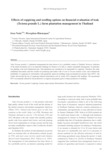Effects of coppicing and seedling options on financial evaluation of teak (Tectona grandis L.) farm plantation management in Thailand
JIRCAS Working Report
| ISSN | 1341710X |
|---|---|
| NII recode ID (NCID) | AA11159468 |

Full text
jircas_working_report85-_87-98.pdf687.75 KB
Teak (Tectona grandis L.) plantation management has been shown to be a profitable venture in Thailand. However, reduction of the initial investment cost is an important challenge for farmers to be able to conduct sustainable management. In particular, tree planting is the most burdensome part. Teak plantations are considered to be regenerable by coppicing. Therefore, this study established discounted cash flow models for producing teak timber with 15-year or 20-year rotation cycles, and evaluated the profitability of coppicing for reforestation with genetically improved seedlings using incremental net present value (NPV). The results showed that the use of coppicing reduced reforestation costs by nearly 60% compared with seedlings. The incremental NPV was markedly affected by the productivity of coppices and genetic gain in volume production of seedlings.
| Date of issued | |
|---|---|
| Creator | Iwao Noda Woraphun Himmapan |
| Subject | Tectona grandis Coppicing Genetic improvement Reforestation Discounted cash flow |
| Volume | 85 |
| spage | 87 |
| epage | 98 |
| Relation | isPartOf : JIRCAS Working Report no.85 |
| Language | eng |
isPartOf
